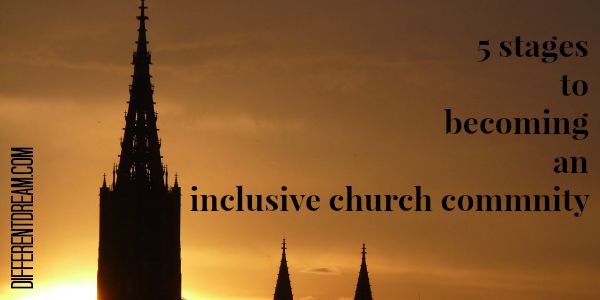5 Tips to Help Create an Inclusive Church Community

Different Dream is happy to introduce guest blogger Dan Vander Plaats to readers today. Dan works for Elim Christian Services in Palos Heights, Illinois, a ministry that exists to equip people who live with disabilities to answer God’s call on their lives. He’s also the creator of 5 Stages, a vehicle for changing attitudes about people with disabilities. Today, he’s here with some tips churches can use to create a more inclusive church community.
5 Tips to Help You Create a 5 Stages Inclusive Church Community
Over the last few years, I’ve spoken more and more often to groups of people that want to help their churches become more inclusive of people with disabilities. One of the questions I always hear afterwards is, “What do you do when your church has no interest in including people with disabilities?”
What a challenge it is to convince others to come with us on our journey, to care about people with disabilities! They have their own families, their own challenges, and their own causes. Why should they care about yours?
And there’s the rub, after all. Why should they care? And how will anything change until they do care?
Getting people to care was always a challenge for me too. I live with a speech disability, so the cause of people with disabilities has always been an important one to me. I spent many years trying to convince others to care about the issue as much as I did.
The 5 Stages was developed to allow easy self-assessment of attitudes. Used for that purpose, the tool will help users conclude that their attitudes about people with disabilities need to change. The point of The 5 Stages is that we “are all God’s handiwork, created… to do good works, which were prepared in advance” (Ephesians 2:10). And since we all have work to do for God’s Kingdom, then it isn’t optional. We all must change our attitudes. We must develop a “Stage 5 attitude” and see people with disabilities as “co-laborers” in the Kingdom.
So how can you help your church or other community become a 5 Stages community? The following is the process I’ve been pursuing in my own church, and in other places as well. The process requires patience, prayer, and persistence. But there’s one more thing. There’s also pay-off. So, here are 5 tips for creating a 5 Stages inclusive church community:
- Be convicted that progress only comes when attitudes get changed. Demanding rights and equality have achieved some changes to our sidewalks and buildings, but no matter how much we do on the surface, we don’t make real change unless it’s in people’s hearts. Getting a church to install a ramp can take years of convincing. How could that be different if we focused on changing attitudes first? If you are convicted that attitudes are the first priority in changing your community, then you have laid a foundation for progress.
- Develop a team that shares your goals. You can’t expect everyone to buy into your vision right away, but the more you share your hopes to ‘change attitudes’ in your church or community, the more you’ll find people who agree or are receptive to the idea. Help these partners capture the vision to change your community, and you are well on your way! There’s no ideal size, but it may be a good idea to get people that represent a cross-section of your community, if possible.
- Convince leadership of the importance of this vision. Once you have your group pulled together, enlist their assistance in helping your church or community leadership to see how this could change the church. Help your leadership understand that this does not need to compete with any other priorities, but that it can support all the community’s priorities (i.e.–if your church isn’t getting enough volunteers, what about equipping people with disabilities to participate and support what’s going on?)
- Identify goals. If you’ve got leadership on your team, it’s time to start addressing some specific needs. Here are some suggestions:
• Do an assessment of disability attitudes in your church
• Create more disability awareness by doing a 5 Stages presentation in your church’s education program or showing a 5 Stages video to your church council or to the education or missions team.
• Connect your church to a local group home or disability organization
• Identify specific special needs of members already in your church
• Investigate the creation of a Friendship group
• Consider including people with disabilities on your worship team or in leading prayers or scripture reading
• Think about the possibility of a respite group, or a support group for area families - Accept setbacks and keep pressing. Okay, maybe this is two tips in one, but they go hand in hand. You won’t always succeed. A friend at Elim Christian Services, where I work, once told me that the best special education teachers aren’t those with advanced degrees or the best practicums or grades. They were the ones who were willing to try and fail. And try again. And keep trying until they made progress. You will run into obstacles, and into people who discourage you. You simply need to keep going.
I hope these tips were helpful and practical, even though they were intentionally broad. I also want you to know that there are lots of great resources out there for you. Feel free to share your favorites in the comments below. In the meantime, I hope the following resources will help you start creating an inclusive church community that sees people with disabilities as “co-laborers!”
Resources:
The 5 Stages: We provide a number of resources, including 10 different translations of The 5 Stages, from our website
Disability Concerns: Links to the disability ministries for the Christian Reformed Church in North America and to the Reformed Church in America
MNA Special Needs Ministry: Special needs resources offered by the Presbyterian Church in America
Friendship Ministries: Developers of Sunday School curriculum based on different special needs
Key Ministry: An online resource for learning more about a wide range of disability-related topics
Faith Inclusion Network: A fantastic ecumenical advocacy resource for people with disabilities
Rising Above Ministries: A phenomenal organization that helps churches build special needs ministries
All Belong (formerly CLC Network): Publishes of the GLUE manual and resources, along with being the working home of the late Barb Newman
Joni and Friends: This international ministry offers resources and lots of opportunities for your community to get involved.
What Do You Think?
Do you have questions for Dan? Or ideas of your own about creating more inclusive church communities? Leave your ideas in the comment box.
Do you like what you see at DifferentDream.com? You can receive more great content by subscribing to the quarterly Different Dream newsletter and signing up for the daily RSS feed delivered to your email inbox. You can sign up for the first in the pop up box and the second at the bottom of this page.
By Dan Vander Plaats
Dan Vander Plaats is the Director of Advancement at Elim Christian Services in Palos Heights, Illinois, a ministry that exists to equip people who live with disabilities to answer God’s call on their lives. He is also a member of the advisory committee for Disability Concerns for the Christian Reformed Church and the Equipping Team of the Chicago office of Joni and Friends. In 2009, he developed “5 Stages: Changing Attitudes” as a resource for Elim. The 5 Stages helps churches and individuals assess their attitudes toward people with disabilities. He is married to Denise (Hiemstra), and is father to Ben and Emma. They are members of Orland Park Christian Reformed Church in Illinois, where Dan also serves on the Disability Concerns team.
2 Comments
Submit a Comment
Subscribe for Updates from Jolene
Related Posts
The Lessons I Learned while Raising a Child with EA/TEF
Jolene Philo reflects on a lifetime of lessons learned while raising a child with EA/TEF and shares the insights she’s won.
Looking Back at Your Child’s EA/TEF Journey
Looking back at your child’s EA/TEF journey can give parents a new perspective about past events. Guest blogger Maggi Gale shares how her look back clearly showed her how God was with their family during their daughter’s very unusual first weeks of life in 2002. Three...
How Do I Let Go of My Adult EA/TEF Child?
Valeria Conshafter explores the question “How do I let go of my adult EA/TEF child?” for EA/TEF Awareness Month.







You are so welcome. Jon. All the best to you. Stop back with an update whenever you can. And feel free to contact me using the website’s contact tab. Jolene
I’m glad I found this post. My wife and I have been working with a few others in our church to move our special needs ministry forward. We have, and continue, to struggle with getting staff and others in he congregation to care about this ministry. We are involved in every facet of the ministry because we enjoy it, but also so others can see our passion for ministering to the special needs community. These ministries are close to our hearts because of our son with autism, who is also visually & hearing impaired.
Thank you for the encouragement you shared in this post.